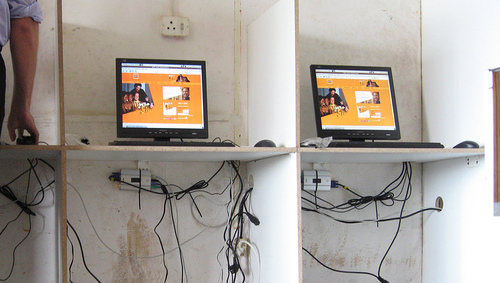
A photograph of Quentin, who is in South Africa installing Ndiyo systems. Cape Town’s in the background. I do not recall any order for a marine installation (he said, enviously). Humph!

The fall of Baghdad in April 2003 opened a secretive and brutal regime to outside scrutiny for the first time. The U.S. Joint Forces Command (USJFCOM) commissioned a secret comprehensive study of the inner workings and behavior of Saddam Hussein’s regime based on previously inaccessible primary sources.
In the words of the journal Foreign Affairs,
Two years in the making, the report of the “Iraqi Perspectives Project” draws on interviews with dozens of captured senior Iraqi military and political leaders and hundreds of thousands of official Iraqi documents from all levels of the regime, and is destined to rewrite the history of the war from the ground up. Excerpts from the report itself are presented exclusively in a special double-length article from the upcoming May/June issue of Foreign Affairs.
Highlights include:
Full, fascinating, text here.
A couple of striking passages:
A 1982 incident vividly illustrated the danger of telling Saddam what he did not want to hear. At one low point during the Iran-Iraq War, Saddam asked his ministers for candid advice. With some temerity, the minister of health, Riyadh Ibrahim, suggested that Saddam temporarily step down and resume the presidency after peace was established. Saddam had him carted away immediately. The next day, pieces of the minister’s chopped-up body were delivered to his wife. According to Abd al-Tawab Mullah Huwaysh, the head of the Military Industrial Commission and a relative of the murdered minister, “This powerfully concentrated the attention of the other ministers, who were unanimous in their insistence that Saddam remain in power.”
And this…
Fear of Saddam’s reaction to bad news was not limited to his ministers and soldiers. Its pernicious effects reached even into Saddam’s immediate family. One former high-level official related the following story about Qusay:
At the end of 2000, it came to Saddam’s attention that approximately seventy military vehicles were immobile. Saddam told Qusay to resolve the problem. Republican Guard mechanics claimed they could repair the vehicles if the funds were made available. Qusay agreed to the work, and funds were provided for the task. Once the work was completed, Qusay sent a representative to inspect the vehicles and he found them lined up on a vehicle park, thirty-five vehicles on each side. The vehicles looked like new, having been freshly painted and cleaned.
After Qusay’s representative inspected them, a second inspection was conducted to verify that they were now operational. The staff was told to supply drivers to move all [the] vehicles to the opposite side of the vehicle park to ensure they were in working order. None of the seventy vehicles would start. When this was reported to Qusay, he instructed that Saddam not be informed, as Qusay had already told Saddam that the vehicles were operational.
In the end, Qusay did not order mechanics to fix the vehicles — it appears that he was eager only to hide this failure from his father.

Quentin’s installed the first Ndiyo networks in South Africa, using 3G mobile phones to provide internet connectivity. As ever, the biggest problem is sorting out the power cables. The Nivo thin clients are fixed to the wall under the desk. Nice to think that each of them replaces an ugly, power-hungry, resource-consuming PC!
“Funny paper, the Guardian“, remarks Simon Jenkins at the end of his (Guardian) column arguing that Blair is the best bet Labour has. What’s really funny is that the paper pays Jenkins something like £200k a year for his increasingly-jaded rants. Meanwhile, in another part of the forest, the paper argued, in an editorial, that Blair’s time was up. And, today, Jonathan Freedland argued that the Prime Minister’s credibility is shot. He’s right.
The crude, harsh truth is that no one can take what Blair says on foreign policy seriously, because he is responsible for the greatest foreign-policy disaster in half a century of British history. No matter that he emerged as a major world leader during the Kosovo war, or that he won international admiration after the Good Friday agreement. Now, because of that one fateful decision, his credibility is shot.
And it is not just in international affairs that Blair is overwhelmed by Iraq. Take the current sleaze affair. A useful law of scandal is that charges only bite when they confirm a pre-existing suspicion. In the 1990s Britons believed the Major government was decayed; the Hamilton and Aitken revelations duly validated that belief. When the Bernie Ecclestone affair broke in 1997, voters didn’t see Blair or New Labour as financially corrupt (even though the charge then, of cash-for-policy, was much graver than anything revealed now). Today’s scandal bites because it plays into something Britons do now believe about their government: that it is not honest and cannot be trusted.
And the explanation for that, once again, is Iraq. Polls show that Blair was broadly trusted before the invasion. But he told the nation that Saddam had weapons of destruction when he didn’t, and Blair has never been trusted since. In this sense, removing Blair over a few undisclosed loans would be like jailing Al Capone for tax evasion: he will be punished for a small offence because the system couldn’t get him for the much larger one.
This is interesting — as significant in its way as the original Demon Internet precedent. From Guardian Unlimited…
A landmark legal ruling ordering a woman to pay £10,000 in damages for defamatory comments posted on an internet chatroom site could trigger a rush of similar lawsuits, a leading libel lawyer warned today.
Michael Smith, a Ukip activist who stood for the Portsmouth North seat last year, became the first person to win damages yesterday after being accused of being a “sex offender” and “racist blogger” on a Yahoo! discussion site.
Mr Smith, 53, from Fareham in Hampshire, sued Tracy Williams, of Oldham, for comments posted after she joined a rightwing online forum in 2002.
Judge Alistair MacDuff said in the high court that Ms Williams was “particularly abusive” and “her statements demonstrated that … she had no intention of stopping her libellous and defamatory behaviour”.
The judge ordered Ms Williams never again to repeat the “unfounded” defamatory remarks, which included calling Mr Smith a “nonce” and accusing him of sexual harassment.
Although ISPs have paid out for hosting defamatory comments, this case is thought to be the first time an individual has been found to have committed libel on a internet chat site.
Stung by complaints that the media report only bad news from Iraq, the ABC News Baghdad bureau went looking for something cheerful. Its reporters found a new romantic television comedy, “starring the Danny DeVito of Iraq”. Sadly, while they were recording this upbeat tale, they were interrupted by the news that the impresario behind the show had just been shot dead.
The Economist, March 18, 2006, page 43.
From an entertaining list of extreme IP nonsense…
Microsoft UK held a contest for the best film on “intellectual property theft”; finalists had to sign away “all intellectual property rights” on “terms acceptable to Microsoft.”
Is there no end to this Google nonsense? Does anyone really care if “Brazilian Treasury Yield Rises on US Rate Outlook”?
No, you couldn’t make this up. Good Morning Silicon Valley reports…
Good thing the FBI teaches agents Morse code because chances are they may need it. According to Mark Mershon, the assistant director in charge of the agency’s New York City office, budget constraints have deprived some FBI agents of e-mail accounts.
“As ridiculous as this might sound, we have real money issues right now, and the government is reluctant to give all agents and analysts dot-gov accounts,” Mershon told the New York Daily News yesterday. “We just don’t have the money, and that is an endless stream of complaints that come from the field.”
Lovely piece by Marina Hyde.
Charles Falconer’s tour of the breakfast studios yesterday contrived – almost unthinkably – to take the mental cheating that has characterised the party’s handling of the donations affair and so many before it to a new low.
The government welcomed people’s concerns, explained his Lordship. Good heavens, they were concerned themselves, and wished to take this chance to take a close look at party funding, to further “clean up” the system, adding that they would most certainly be making it compulsory to disclose any loans in the future.
So, if we are to understand him: a tiny cabal of New Labour figures sought a loophole in legislation they had fashioned entirely themselves, exploited it ruthlessly in total secrecy, were exposed, and now seek to have a “public debate” about it, proposing to outlaw a practice that was personally sanctioned by the prime minister in private barely one year ago.
Did you ever hear anything so intellectually weak in your life?
Since you ask, Marina, no.